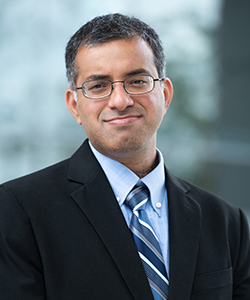- College of Medicine Population Health Research Residents Students
A College of Medicine alum and his UCF research mentor have secured a patent for a digital tool that will help provide better care for patients with chronic illnesses like diabetes, heart and chronic kidney disease.

The tool is an algorithm that identifies gaps and incomplete information in digital health records and is the latest research collaboration between Dr. Varadraj Gurupur, associate professor in UCF’s School of Global Health Management and Informatics, and Dr. Ayan Nasir, a 2020 graduate at the medical school. As a UCF undergraduate and medical student, Dr. Nasir did research with Dr. Gurupur on health informatics, including his FIRE (Focused Inquiry and Research Experience) module project. Dr. Nasir is now a primary care/lifestyle medicine physician in Clermont, FL.
A patient’s entire medical journey lives in digital health records, but those records can be wrong, incomplete or missing important information. That’s especially true when patients have multiple physicians who are managing their care for chronic diseases. The UCF patented algorithm uses computer science and mathematics to digitally map electronic medical records and find inconsistencies in diagnoses, illness staging and follow-up care.
“These patients can have 10 different doctors using 10 different electronic health record systems,” said Dr. Nasir. “This digital mapping tool helps all the providers stay on the same page. And it helps patients. Many are on patient portals and have access to their electronic health records. They see one doctor has put their disease as Stage 1 and the other at Stage 2 and they are confused and worried.”
Dr. Gurupur compares missing information in the electronic health records (EHR) that hospitals and doctor’s offices keep to a leaking pipe. If you don’t know where the leak is, you can’t fix it, he says, and soon the house can flood. The same dangers can happen in healthcare. A recent study by Dr. Gurupur revealed that a critical percent of digital health records contained missing information. For example, a primary care physician notes that a patient showed mild dementia at an appointment a year ago. But notes from the latest appointment make no mention of dementia. Or a patient with limited English fluency doesn’t tell the doctor they are on a drug for diabetes. So the new doctor prescribes a new drug for diabetes – even though the patient may still be taking the old one.

While electronic health records have been in use for more than a decade, healthcare is just “scratching the surface” of how to better use this data to improve care, Dr. Gurupur said. “We are just beginning to identify some of the challenges that need to be met.”
The two hope that the patient will encourage clinics and health systems to use the digital mapping to identify missing information that will improve care. They note that the mapping can also help providers better reflect the health status of their patients to improve insurance reimbursements.
Dr. Nasir recently completed his internal medicine residency at Mayo Clinic in Jacksonville, where he also completed a master’s degree in health informatics at Northwestern University. He is focusing his practice on lifestyle medicine and ways that changes in diet, exercise, stress and other factors can improve care of chronic conditions. He said he uses data and electronic information daily with his patients – for example, showing them data on how their risk for heart disease can be lowered by exercise, reducing cholesterol and quitting smoking.
He came to UCF’s medical school after working in finance and says he was horrified that banks had better access to digital information for quality control than did healthcare providers. That’s why he began working with Dr. Gurupur. He says research and the FIRE module were an important part of his training, noting that last week was the College of Medicine’s 15th FIRE Conference, where medical students present their research. UCF is unique nationally because it requires all M.D. students to complete the two-year scientific research project as a way to better understand research, build their “spirit of inquiry” and add to medicine’s knowledge.
“Research has been such a bridge for me in medicine,” he said. “I can see 25 or 30 patients in a day and directly impact their lives. Research that improves patient care allows me to have a positive impact on a larger scale.”
Post Tags
- chronic disease digital health records population health